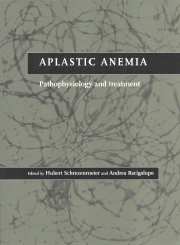Preface
Published online by Cambridge University Press: 18 August 2009
Summary
Recently important progress has been made to improve our understanding of the pathophysiology of aplastic anemia and the clinical management of this rare disease.
For a long time the pathophysiology of aplastic anemia remained a mystery, until a series of new studies provided new insight into this matter. The new information includes demonstration of a defect in bone marrow in those with aplastic anemia at the level of long-term culture-initiating cells; further evidence for the pathophysiological relevance of inhibitory cytokines; the assessment of cytokine action in vitro on bone marrow in aplastic anemia, and the analysis of cytokine expression in aplastic anemia; new results on autoreactive T-cells in aplastic anemia; evidence of roles for Fas-antigen and apoptosis in the pathophysiology of aplastic anemia; the elucidation of the relationship between aplastic anemia and paroxysmal nocturnal hemoglobinuria at the molecular level; and new data on the issue of clonality in bone marrow failure.
The main treatment options for aplastic anemia are bone marrow transplantation and immunosuppressive treatment. Progress in bone marrow transplantation for aplastic anemia includes new conditioning regimens and increasing the number of transplants in aplastic anemia from alternative donors.
During the 1990s a series of clinical studies on treatment with immunosuppression and growth factors were performed. These studies helped to improve standard immunosuppressive treatment. There are, however, still many questions on the place of hemopoietic growth factors in the treatment of aplastic anemia.
Information
- Type
- Chapter
- Information
- Aplastic AnemiaPathophysiology and Treatment, pp. xi - xiiPublisher: Cambridge University PressPrint publication year: 1999
